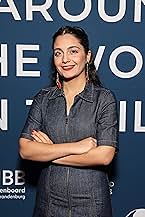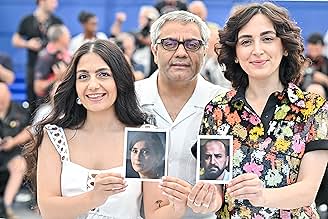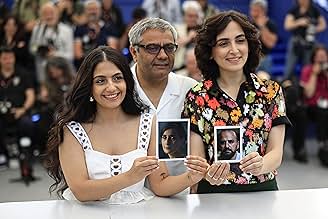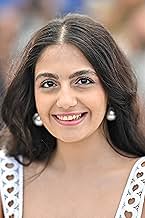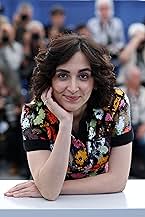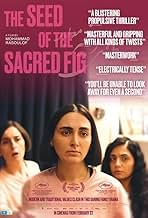Inmitten der politischen Unruhen in Teheran kämpft der Untersuchungsrichter Iman mit Paranoia. Als seine Waffe verschwindet, verdächtigt er seine Frau und seine TöchterInmitten der politischen Unruhen in Teheran kämpft der Untersuchungsrichter Iman mit Paranoia. Als seine Waffe verschwindet, verdächtigt er seine Frau und seine TöchterInmitten der politischen Unruhen in Teheran kämpft der Untersuchungsrichter Iman mit Paranoia. Als seine Waffe verschwindet, verdächtigt er seine Frau und seine Töchter
- Regie
- Drehbuch
- Hauptbesetzung
- Für 1 Oscar nominiert
- 36 Gewinne & 72 Nominierungen insgesamt
Empfohlene Bewertungen
SotSF is pretty great until near the end when the tension started to dissipate (or maybe it is because if you show a gun for that long, the anti-climax of it *not* going off should be earned and I am not convinced this did). Maybe it was seeing so many putting this in the top, top pantheon of the year's films; not only it's Oscar nomination, but the nature of how it was basically smuggled out of the country to be Screened at Cannes (itself a bold and inspiring story to get to where it found distribution for much of the world) brings an expectation, not to mention the run time. The fact that it is really really profound and strong in the ways that matter counts though, especially as a film about family dysfunction and how the roles they've been put into are disastrous.
I loved how the mother was not that sympathetic to the daughters early on, and yet there were more than a few wrinkles in what the filmmaker shows us of the distance between husnand and wife - all those nights where he comes home and she at first stays up but then falls asleep as he is out longer and longer (and to look back after the film is done at those scenes and to understand *why* he was out so long having "meetings" at work adds to the chilling nature of his response) - and that if it wasn't for this missing gun something else was going to break in this family some way. And this is a time period that is not some far off context but a society that is actively in religious oppression and armed to the teeth.
Some of the film is shot fairly standard, coverage being largely shot reverse shot and so forth for dialog, but what's impressive to me is when Rasoulof breaks from this, like when the girl's friend is at the house with the battered face and the mother takes time to pick out the pieces of weaponry from her wounds. That is the most upsetting part of the whole film if I take stock of it all, in how carefully she takes in picking out those pieces, and it's also from here that the mother Najmeh may not say it outright (and she still has a lot of motherly consternation for her daughters after this, especially in the "it'll upset your father" realm, Golestani is in like 6 dimensions with her performance), but she is changed and has to see things differently now. Or will she, is a key question.
It does lean more into a Genre/Thriller kind of story in the last half hour - almost like something out of the Shining if one were to say more like a Horror film (only our dad/husband just has his own maniacal paternal paranoia and self hatred to blame) - and that isn't quite as absorbing as just seeing this family at home. But we do need that moment where the two people following the family on the road confront the dad, for us to see just what extent they are at now in the story, and that it almost has to unravel from there with what the gun is really all about. And all of this with the immediate and harrowing backdrop of the protests and demonstrations of the period, it makes for an extremely satisfying film.
I loved how the mother was not that sympathetic to the daughters early on, and yet there were more than a few wrinkles in what the filmmaker shows us of the distance between husnand and wife - all those nights where he comes home and she at first stays up but then falls asleep as he is out longer and longer (and to look back after the film is done at those scenes and to understand *why* he was out so long having "meetings" at work adds to the chilling nature of his response) - and that if it wasn't for this missing gun something else was going to break in this family some way. And this is a time period that is not some far off context but a society that is actively in religious oppression and armed to the teeth.
Some of the film is shot fairly standard, coverage being largely shot reverse shot and so forth for dialog, but what's impressive to me is when Rasoulof breaks from this, like when the girl's friend is at the house with the battered face and the mother takes time to pick out the pieces of weaponry from her wounds. That is the most upsetting part of the whole film if I take stock of it all, in how carefully she takes in picking out those pieces, and it's also from here that the mother Najmeh may not say it outright (and she still has a lot of motherly consternation for her daughters after this, especially in the "it'll upset your father" realm, Golestani is in like 6 dimensions with her performance), but she is changed and has to see things differently now. Or will she, is a key question.
It does lean more into a Genre/Thriller kind of story in the last half hour - almost like something out of the Shining if one were to say more like a Horror film (only our dad/husband just has his own maniacal paternal paranoia and self hatred to blame) - and that isn't quite as absorbing as just seeing this family at home. But we do need that moment where the two people following the family on the road confront the dad, for us to see just what extent they are at now in the story, and that it almost has to unravel from there with what the gun is really all about. And all of this with the immediate and harrowing backdrop of the protests and demonstrations of the period, it makes for an extremely satisfying film.
The seed of the sacred fig is the first relevant, powerful film about the Iranian rebelion that took place in 2022. The Woman, Life, Freedom's movement was born right after the arrest and death of Jina Mahsa Amini, a student that did nothing but remove her veil. The director takes us down to a family of an Iranian judge (working for the State and the Mollah 's regime) who is about to receive a promotion that is supposed to change his life right at the moment the 2022 revolution starts. We spectators somehow live this key period of Iran through the eyes of this middle class family which is about to upgrade its living conditions. We are emerged in their every day life until the gun of the father (the judge) disapears or gets stolen inside their home.
The film features a fantastic script, wonderful actors and images of an unknown Iran. You can see Iran like we can rarely see it, with its modernity, its rich history and ancient monuments, its poverty as well as its drawbacks. Like in many Iranian films, the spectator is plunged into complex situations with ethical questions which oblige to choose between moral, personal values and loyalty to the regime: Shall I wear this veil or another (less provokative one) ? Should I go the university despite of the strikes ? Shoulld I ask a favor to my neighbor and take the risk of revealing my family's problems? The ethical questions are everywehre, and they are direct consequences of the heavy oppressive regime that has ruled Iran for now decades. All these questions are faced with dignity and sense of duty by the characters , with sometimes even loyalty towards a regime who could not care less about its people. Through these situations are revealed the lack of freedom, the oprression over women, the complicity of those who take profit of this regime and of course the brutality of a regime condemned to sacrifice its own people in order to survive.
The latter will be perfectly depicted through the fate of the father willing to do his job respectfully but obliged to corrupt himself and sacrifice his people in order to survive to this revolution no matter how painful it is.
I particularly enjoyed the insight into the Iranian middle class. Being able to see and imagine what is an every day life for women in Iran is difficult to figure from the Western World. The more the film lenghts the better it gets as you can clearly see the impasse into which the country has plunged, and with it its inhabitants (and in this case this family) condemned to find a guilty among them.
Little by little, we can spot the seeds of discord germinating in this family, into the society, among students, and throughout the world thanks to social networks. That's the other revelation of this film. Social network is the key; that's the tool through which the song Baraye resonates, as well as images of police violence are spread, proofs of the oppression are accumulated, they are the hopes of Iran. The regime can no longer hide behind outrageous lies, the seeds of rebellion are now spread everywhere and the complice of the regime can no longer hide.
A promising outcry and a promising motto for the future Iranian society: Woman, Life, Freedom that we hope, will eventually change Iran for good.
The film features a fantastic script, wonderful actors and images of an unknown Iran. You can see Iran like we can rarely see it, with its modernity, its rich history and ancient monuments, its poverty as well as its drawbacks. Like in many Iranian films, the spectator is plunged into complex situations with ethical questions which oblige to choose between moral, personal values and loyalty to the regime: Shall I wear this veil or another (less provokative one) ? Should I go the university despite of the strikes ? Shoulld I ask a favor to my neighbor and take the risk of revealing my family's problems? The ethical questions are everywehre, and they are direct consequences of the heavy oppressive regime that has ruled Iran for now decades. All these questions are faced with dignity and sense of duty by the characters , with sometimes even loyalty towards a regime who could not care less about its people. Through these situations are revealed the lack of freedom, the oprression over women, the complicity of those who take profit of this regime and of course the brutality of a regime condemned to sacrifice its own people in order to survive.
The latter will be perfectly depicted through the fate of the father willing to do his job respectfully but obliged to corrupt himself and sacrifice his people in order to survive to this revolution no matter how painful it is.
I particularly enjoyed the insight into the Iranian middle class. Being able to see and imagine what is an every day life for women in Iran is difficult to figure from the Western World. The more the film lenghts the better it gets as you can clearly see the impasse into which the country has plunged, and with it its inhabitants (and in this case this family) condemned to find a guilty among them.
Little by little, we can spot the seeds of discord germinating in this family, into the society, among students, and throughout the world thanks to social networks. That's the other revelation of this film. Social network is the key; that's the tool through which the song Baraye resonates, as well as images of police violence are spread, proofs of the oppression are accumulated, they are the hopes of Iran. The regime can no longer hide behind outrageous lies, the seeds of rebellion are now spread everywhere and the complice of the regime can no longer hide.
A promising outcry and a promising motto for the future Iranian society: Woman, Life, Freedom that we hope, will eventually change Iran for good.
To better understand the concept behind the film, this might help, learn where the name of the film comes from:
There are plants known as "strangler figs" that exhibit strange behavior. Strangler figs (genus *Ficus*) begin their life as seeds deposited on the branches of a host tree, typically by birds or other animals. The seeds germinate and send down roots that eventually reach the ground. As the roots grow and thicken, they encircle the host tree, creating a lattice-like structure.
Over time, the strangler fig's roots and branches grow larger and more robust, competing with the host tree for sunlight and nutrients. Eventually, the fig's growth can become so extensive that it constricts the host tree's trunk, restricting its ability to transport water and nutrients. This process can lead to the host tree's death, effectively allowing the strangler fig to take over the space and resources previously used by the host.
The strangler fig does not immediately kill the host tree but rather slowly overcomes it through a combination of physical encasement and competition for resources. This fascinating but destructive relationship highlights a unique strategy in the plant kingdom for survival and growth.
Over time, the strangler fig's roots and branches grow larger and more robust, competing with the host tree for sunlight and nutrients. Eventually, the fig's growth can become so extensive that it constricts the host tree's trunk, restricting its ability to transport water and nutrients. This process can lead to the host tree's death, effectively allowing the strangler fig to take over the space and resources previously used by the host.
The strangler fig does not immediately kill the host tree but rather slowly overcomes it through a combination of physical encasement and competition for resources. This fascinating but destructive relationship highlights a unique strategy in the plant kingdom for survival and growth.
The sacred fig is also the strangler fig. It nuzzles its host even as it strangles them to death. The criminal is not the one you expect.
Iman is climbing the ladder in Iran's judicial system. High minded, ambitious, and hard-working, he strives to earn the approval of his superiors and is promoted. Expecting adulation, Iman encounters rebellion instead. Where he presumes love in his workplace, country, wife and daughters, he finds insurgence. If Iman looks inside himself, he might find a way to set things right.
The Seed of the Sacred Fig won two prizes at the Cannes film festival and succeeds because of its authenticity, depth, capable actors, and riveting story. Director Mohammad Rasoulof spent time in prison for the crime of practicing his art of filmmaking. Rasoulof appeared via video at this Toronto International Film Festival screening to tell the story of one of his interrogators who felt shame at his actions and didn't know in what direction to turn. He claimed to be getting grief from his family. This interrogator is the model for the character of Iman.
This raw and unsettling film features actual footage from the violent 2022 uprising in Iran over the death of 22-year-old Mahsa Amini, who was taken into custody for allegedly wearing her hijab improperly. The film reminds us to take a close look at our workplace, country, friends, family, and selves in order not to become a host for any strangler figs, no matter how sacred they claim to be.
Iman is climbing the ladder in Iran's judicial system. High minded, ambitious, and hard-working, he strives to earn the approval of his superiors and is promoted. Expecting adulation, Iman encounters rebellion instead. Where he presumes love in his workplace, country, wife and daughters, he finds insurgence. If Iman looks inside himself, he might find a way to set things right.
The Seed of the Sacred Fig won two prizes at the Cannes film festival and succeeds because of its authenticity, depth, capable actors, and riveting story. Director Mohammad Rasoulof spent time in prison for the crime of practicing his art of filmmaking. Rasoulof appeared via video at this Toronto International Film Festival screening to tell the story of one of his interrogators who felt shame at his actions and didn't know in what direction to turn. He claimed to be getting grief from his family. This interrogator is the model for the character of Iman.
This raw and unsettling film features actual footage from the violent 2022 uprising in Iran over the death of 22-year-old Mahsa Amini, who was taken into custody for allegedly wearing her hijab improperly. The film reminds us to take a close look at our workplace, country, friends, family, and selves in order not to become a host for any strangler figs, no matter how sacred they claim to be.
There are still places on this Earth where women risk death for committing the irremissible crime of bareheadedness; of not wearing enough fabric to God's supposed liking. Such was the case of Mahsa Amini, the Iranian woman who died in the hospital (from "unrelated causes", as the sorts of people we see in this film would try to tell us -- and themselves) after being arrested for not wearing her hijab in public, escalating the ongoing Girls of Enghelab protests to the point of major unrest that lasted from September of 2022 and all the way into the spring of 2023.
In The Seed of the Sacred Fig, directed by Mohammad Rasoulof (the Iranian filmmaker who has often found himself at odds with his government and currently resides in exile in Germany), the events are seen from the perspective of the family of an investigating judge in Tehran. Throughout the film, real TikTok and Instagram videos of the bedlam are interwoven with the narrative. The unrest is reflected in this family; the daughters question the authorities and traditions that their parents protect for little reason other than tradition itself -- and yes, a point of violence is reached.
This is a tense, atmospheric, moving film. I don't wish to reveal too much about it, but I will say this: if this film becomes as big and impactful as it ought to be, its recurring phrase "I won't sit" may get co-opted by many equal rights/freedom movements to come.
Many Oscar opinion-havers this season have quipped, "I don't care who wins; I just need Emilia Pérez to lose". This concerns all categories that it's (somehow) nominated within, including Best International Feature Film. I guess I don't care who wins either. But it should be The Seed of the Sacred Fig.
In The Seed of the Sacred Fig, directed by Mohammad Rasoulof (the Iranian filmmaker who has often found himself at odds with his government and currently resides in exile in Germany), the events are seen from the perspective of the family of an investigating judge in Tehran. Throughout the film, real TikTok and Instagram videos of the bedlam are interwoven with the narrative. The unrest is reflected in this family; the daughters question the authorities and traditions that their parents protect for little reason other than tradition itself -- and yes, a point of violence is reached.
This is a tense, atmospheric, moving film. I don't wish to reveal too much about it, but I will say this: if this film becomes as big and impactful as it ought to be, its recurring phrase "I won't sit" may get co-opted by many equal rights/freedom movements to come.
Many Oscar opinion-havers this season have quipped, "I don't care who wins; I just need Emilia Pérez to lose". This concerns all categories that it's (somehow) nominated within, including Best International Feature Film. I guess I don't care who wins either. But it should be The Seed of the Sacred Fig.
Wusstest du schon
- WissenswertesDirector Mohammad Rasoulof was originally scheduled to take part in the 2023 Cannes Film Festival as a jury member of the Un Certain Regard section. However, he was arrested in July 2022 after criticising the government's crackdown on protestors in the southwestern city of Abadan in Iran over deadly building collapse. On May 8, 2024, Rasouloff's lawyer announced that he has been sentenced to eight years in prison as well as flogging, a fine and confiscation of his property. On May 12, 2024, Rasouloff announced that he managed to flee Iran and was staying at an undisclosed location in Europe. On May 24, 2024, Rasouloff attended the film's premiere in Cannes and on the red carpet he held up photos of two of the film's actors, Soheila Golestani and Missagh Zareh.
- Crazy CreditsOpening credits: "Ficus Religiosa is a tree with an unusual life cycle. It seeds, contained in bird droppings, fall on other trees. Aerial roots spring up and grow down to the floor. Then, the branches wrap around the host tree and strangle it. Finally, the sacred fig stands on its own."
- VerbindungenFeatured in 82nd Golden Globe Awards (2025)
Top-Auswahl
Melde dich zum Bewerten an und greife auf die Watchlist für personalisierte Empfehlungen zu.
Details
Box Office
- Bruttoertrag in den USA und Kanada
- 860.139 $
- Eröffnungswochenende in den USA und in Kanada
- 35.230 $
- 1. Dez. 2024
- Weltweiter Bruttoertrag
- 6.586.600 $
- Laufzeit2 Stunden 47 Minuten
- Farbe
- Sound-Mix
- Seitenverhältnis
- 2.35 : 1
Zu dieser Seite beitragen
Bearbeitung vorschlagen oder fehlenden Inhalt hinzufügen

Oberste Lücke
What is the Canadian French language plot outline for Die Saat des heiligen Feigenbaums (2024)?
Antwort


